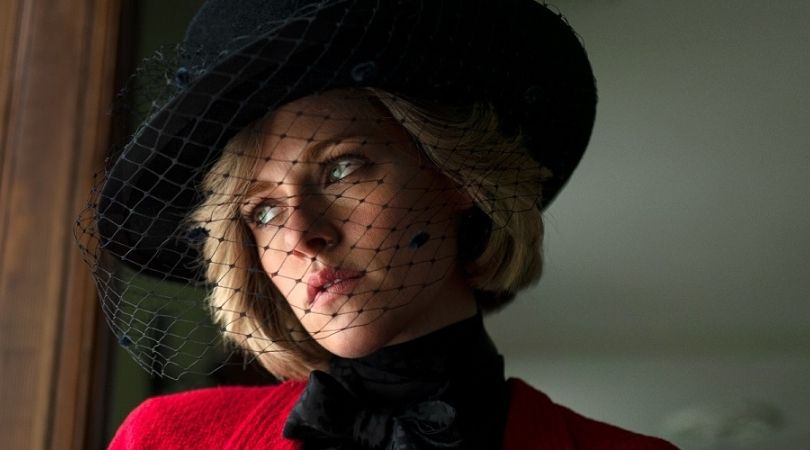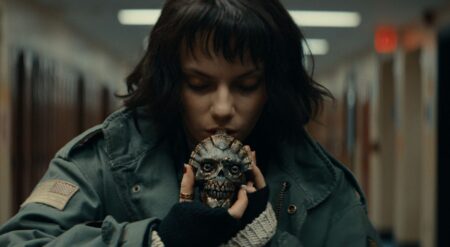
I didn’t know what to expect from Spencer. In truth, I don’t know much about Princess Diana, and I know even less about the events of her death and her life. I remember the way it was treated here in the United States and my mom trying to explain it to me, but the concept of royalty was something that I just never understood. Sure I watched parts of The Crown and watched Diana, which starred Naomi Watts in the titular role. But the first time I ventured into being interested in the Royals’ past, and present was when Meghan Markle gave her interview to Oprah. And that detachment was why I held off on seeing Spencer. Somehow though, Kristen Stewart’s bitterly melancholic captured me from the moment she first appeared on the screen.
The film is directed by Pablo Larraín and written by Steven Knight. It stars Kristen Stewart, Timothy Spall, Jack Farthing, Sean Harris, and Sally Hawkins. Instead of telling all of Diana’s life, Spencer tells the story of Diana’s struggle in her marriage and with the Monarchy. In the film, Princess Diana and Prince Charles’ marriage has become cold and empty, with the spectre of affair hanging over it. The rumors of an impending divorce paint the Christmas festivities at the Queen’s Sandringham Estate, where shooting, drinking, and hunting take place. Less about the truth of the fateful days during the Christmas holiday and more an imagining of what might have happened, Spencer dives deeply into Diana as a person on the brink and ultimately the villainous crushing grip of the Crown.
Spencer isn’t the first piece of media to portray Diana that I know, but this film captures both Diana’s impact on others and the dire impact the Monarchy had on her as a person. Every moment of Stewart’s time on-screen shows a woman teetering on the edge of losing herself to the pressure and system set in place to keep her subdued and quiet. The film itself uses silence in a way that creates a sense of dread. A family portrait becomes deeply tense as each member shuffles in. A dinner becomes a fight for identity in silence as Stewart’s Diana moves from awkwardness to anxiety which then proceeds to rage and then warps into pain until we realize it was happening in her mind. It’s in the silence that Spencer lets the dread of the circumstances build, crafting an intimate portrait of a woman who was magnificent and who was consistently trying to avoid her wings being clipped by the Crown.
There are not enough words to compliment Stewart’s complete transformation into Princess Diana. Her signature stoic face and powerful eyes convey stubbornness and pain and hope from scene to scene. Her delivery of every line comes out like at any moment she’ll break. Stewart is Diana, and it’s clear she threw her entire being into bringing this story and the woman at the center of it to life.
While there is a lot to applaud, it’s Spencer’s portrayal of Diana’s bulimia that hit home for me. Having survived over a decade long with bulimia myself, there are many misconceptions that go into who suffers from them. Instead of just being rooted in aesthetics as often portrayed, eating disorders often manifest from other disorders like addiction, anxiety, depression, and the like. In Spencer, Diana’s bulimia, her relationship with food exists as a way to foster a sense of agency and control in a life that has been ripped from her. When presented in context, Diana’s struggles with food are presented as a tool for her, one that is showcased as both damaging to her health and necessary for her to move through a suffocating world. I’ve been there. Knowing the pain, I’m causing myself while also convincing myself that it’s my only way to take control. Spencer deftly portrays this, and Stewart viscerally acts it.
Stewart brings forth a haunting cold dissociation from her surrounding that pull all focus to her, not her title, but who she is under it. As the strongest performance of her career, Diana in Spencer holds strength and vulnerability that is beautiful and bitter, empathetic and isolating, and in truth, a performance that sticks with you well past the film’s end.
Beyond the painful beauty of Stewart’s performance and the both dreamlike and nightmarish score from Jonny Greenwood, Spencer’s costuming is breathtaking. Recreating some of Diana’s most iconic looks and setting the film’s period perfectly, there is a soul to every costume. Every dress has an emotion and a purpose, and none of it appears on the screen just to be on screen. Costume Designer Jacqueline Durran has created every garment with intention, and every word and mannerism performed by Stewart executes them.
Spencer, on paper, is just another story about the Royals, another story about a woman’s tragedy. But in practice, when you hit play, Spencer is so much more. It’s a painfully bitter pill to swallow about a woman so idealized and immortalized in the minds of millions. And that isn’t a bad thing. Spencer isn’t about shattering illusions of Princess Diana; it’s about showcasing her as a human, as a mother, as a wife, as someone desperately trying to hold on when everything is falling apart around her. It’s about how pressure builds and builds, and the expectations of a world cause you to buckle despite your strength. Spencer is about what happens in the silence, what’s left unsaid, and more importantly, about the way women like Diana persevere, even though, as viewers, we know the impending tragedy to come.
Spencer doesn’t captivate, it haunts.
Spencer is playing in select theaters now.
Spencer
-
Rating - 9/109/10
TL;DR
Spencer, on paper, is just another story about the Royals, another story about a woman’s tragedy. But in practice, when you hit play, Spencer is so much more. It’s a painfully bitter pill to swallow about a woman so idealized and immortalized in the minds of millions. And that isn’t a bad thing. Spencer isn’t about shattering illusions of Princess Diana; it’s about showcasing her as a human, as a mother, as a wife, as someone desperately trying to hold on when everything is falling apart around her.






